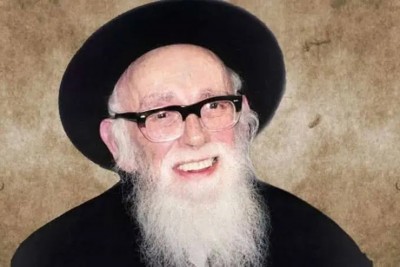
“For I have known him [Avraham], that he will command his children and his household after him.” (Bereishit 18:19)
Among the great mechanchim (Torah educators) of our generation stands Rav Yechiel Yaakovson, one of the foremost voices in chinuch in Eretz Yisrael. For decades, he has inspired parents and teachers through his bestselling books, lectures, and workshops that combine practical wisdom with profound emunah. Known for his humor, warmth, and empathy, Rav Yaakovson’s unique approach centers on instilling joy and connection to Torah rather than pressure or guilt. His life’s mission has been to show that love and respect are the strongest tools in nurturing the Jewish soul.
In his youth, Rav Yaakovson lived with his parents in the Beit Vagan neighborhood of Jerusalem—directly across from the Kol Torah yeshivah. It was there that he would often see one of the giants of the generation, Rav Shlomo Zalman Auerbach, zt”l, standing outside the yeshivah gates after delivering his daily shiur.
Rav Shlomo Zalman, who served as Rosh Yeshivah of Kol Torah and later as one of the foremost poskim in the world, was renowned not only for his mastery of halachah but for his humility and gentle heart. Though his brilliance in Jewish law made him a global authority—his sefarim like Meorei Eish and Minchat Shlomo are still studied widely
—those who met him remember his kindness even more than his intellect. He was a sage whose warmth illuminated his greatness.
A Curious Child and a Giant in Torah
Each day, as young Yechiel returned home from cheder, he would see Rav Shlomo Zalman outside, patiently waiting for his ride. Around him gathered a small crowd of people—Jews who used those few spare minutes to ask him questions in halachah or life guidance.
For days, the boy imagined what it would be like to approach the Rav and ask him something. Then, one afternoon, lost in thought, he suddenly realized he had stepped forward and said aloud, “I have a question!”
The crowd moved aside, and Rav Shlomo Zalman bent down toward him with his trademark smile. “Mah she’eilatcha, tzaddik?—What is your question, righteous one?”
A Child’s Question—and a Rav’s Wisdom
Caught by surprise, little Yechiel froze. He had no question prepared! But then, the same question that had earned him a sharp rebuke from his melamed the day before came rushing back into his mind.
His class had learned the Gemara at the end of Makkot:
“Ratzah HaKadosh Baruch Hu lezakot et Yisrael, lefichach hirbah lahem Torah u’mitzvot”—Hashem wished to grant merit to Israel; therefore, He gave them much Torah and many commandments.
“But Rebbe,” he asked innocently, “if Hashem wanted to give us merit, wouldn’t it make more sense to give us fewer mitzvot? The more there are, the easier it is to fail!”
Rav Shlomo Zalman’s eyes sparkled. “That’s a good question you’ve asked.”
For the boy, that alone was enough—someone of such stature validating his curiosity. But the Rav continued, offering an answer that would forever transform how the child viewed mitzvot.
The Mitzvah Beneath Our Feet
“I’ll give you an example,” said the Rav. “You know there’s a halachah about how to put on shoes and how to tie them?”
“Yes,” the boy replied, “we just learned that.”
The Rav smiled, as if reading his thoughts. “And maybe you wondered—why must the Rabbis tell me even how to tie my shoes?”
He leaned closer. “Do you see Hashem’s kindness? He loves you so much that He planted mitzvot beneath your feet. Every morning, you put on shoes anyway—but Hashem gave you a way to make it holy. You’ll perform this act thousands of times throughout your life, and each time it will be a mitzvah, a connection to the Divine. That is the meaning of ‘He wished to grant merit to Israel.’ Hashem filled our daily lives with opportunities to do good, even in the smallest gestures.”
Then Rav Shlomo Zalman chuckled softly and added,
“We put on shoes—and earn reward. They put on shoes—and earn nothing. We tie shoes—and earn reward. They tie shoes—and earn nothing. Do you see the difference?”
At that moment, his car arrived. He waved goodbye, leaving behind a young boy whose heart had been forever touched.
The Eternal Lesson in Chinuch
Rav Yechiel Yaakovson often shares this encounter as one of the defining moments that shaped his philosophy of education. It revealed that how we present Torah and mitzvot determines how they will live in a child’s heart.
One can educate through fear—saying “you must” and “you can’t”—but this breeds distance. True chinuch begins with love: showing that every mitzvah is not a burden, but a privilege, a Divine embrace hidden in the details of daily life.
That was the essence of Rav Shlomo Zalman’s greatness, and it became the foundation of Rav Yaakovson’s life work—to teach the next generation not only to observe Torah, but to fall in love with it.
Rabbi Leeor Dahan, a graduate of Yeshiva Chofetz Chaim/RSA, is a noted scholar and teacher, well-versed in halachah. He currently leads Kehilat Avodat Hashem in Hillcrest, Queens, inspiring his congregation to delve into Torah study and embrace its eternal teachings.
What Is Your Question, Tzaddik? — A Life-Altering Encounter
Typography
- Smaller Small Medium Big Bigger
- Default Helvetica Segoe Georgia Times
- Reading Mode




